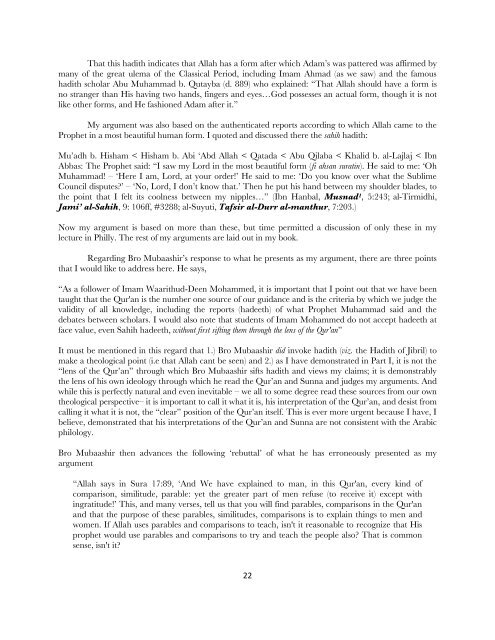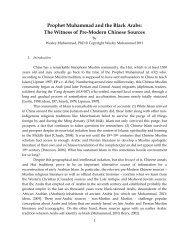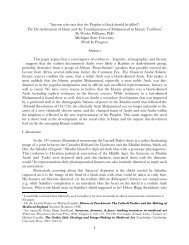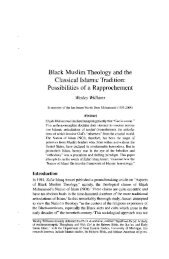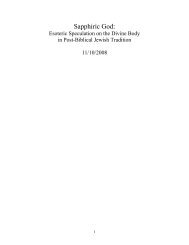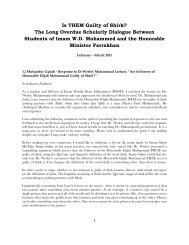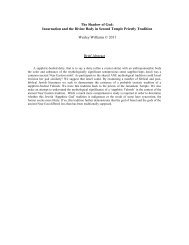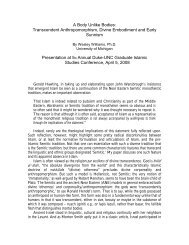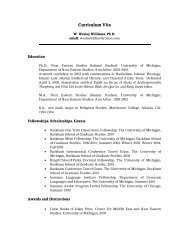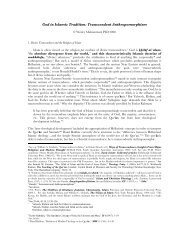Is THEM Guilty of Shirk? - Dr. Wesley Muhammad
Is THEM Guilty of Shirk? - Dr. Wesley Muhammad
Is THEM Guilty of Shirk? - Dr. Wesley Muhammad
You also want an ePaper? Increase the reach of your titles
YUMPU automatically turns print PDFs into web optimized ePapers that Google loves.
That this hadith indicates that Allah has a form after which Adam‘s was pattered was affirmed by<br />
many <strong>of</strong> the great ulema <strong>of</strong> the Classical Period, including Imam Ahmad (as we saw) and the famous<br />
hadith scholar Abu <strong>Muhammad</strong> b. Qutayba (d. 889) who explained: ―That Allah should have a form is<br />
no stranger than His having two hands, fingers and eyes…God possesses an actual form, though it is not<br />
like other forms, and He fashioned Adam after it.‖<br />
My argument was also based on the authenticated reports according to which Allah came to the<br />
Prophet in a most beautiful human form. I quoted and discussed there the sahih hadith:<br />
Mu‘adh b. Hisham < Hisham b. Abi ‗Abd Allah < Qatada < Abu Qilaba < Khalid b. al-Lajlaj < Ibn<br />
Abbas: The Prophet said: ―I saw my Lord in the most beautiful form (fi ahsan suratin). He said to me: ‗Oh<br />
<strong>Muhammad</strong>! – ‗Here I am, Lord, at your order!‘ He said to me: ‗Do you know over what the Sublime<br />
Council disputes?‘ – ‗No, Lord, I don‘t know that.‘ Then he put his hand between my shoulder blades, to<br />
the point that I felt its coolness between my nipples…‖ (Ibn Hanbal, Musnad 1, 5:243; al-Tirmidhi,<br />
Jami’ al-Sahih, 9: 106ff, #3288; al-Suyuti, Tafsir al-Durr al-manthur, 7:203.)<br />
Now my argument is based on more than these, but time permitted a discussion <strong>of</strong> only these in my<br />
lecture in Philly. The rest <strong>of</strong> my arguments are laid out in my book.<br />
Regarding Bro Mubaashir‘s response to what he presents as my argument, there are three points<br />
that I would like to address here. He says,<br />
―As a follower <strong>of</strong> Imam Waarithud-Deen Mohammed, it is important that I point out that we have been<br />
taught that the Qur'an is the number one source <strong>of</strong> our guidance and is the criteria by which we judge the<br />
validity <strong>of</strong> all knowledge, including the reports (hadeeth) <strong>of</strong> what Prophet <strong>Muhammad</strong> said and the<br />
debates between scholars. I would also note that students <strong>of</strong> Imam Mohammed do not accept hadeeth at<br />
face value, even Sahih hadeeth, without first sifting them through the lens <strong>of</strong> the Qur'an‖<br />
It must be mentioned in this regard that 1.) Bro Mubaashir did invoke hadith (viz. the Hadith <strong>of</strong> Jibril) to<br />
make a theological point (i.e that Allah cant be seen) and 2.) as I have demonstrated in Part I, it is not the<br />
―lens <strong>of</strong> the Qur‘an‖ through which Bro Mubaashir sifts hadith and views my claims; it is demonstrably<br />
the lens <strong>of</strong> his own ideology through which he read the Qur‘an and Sunna and judges my arguments. And<br />
while this is perfectly natural and even inevitable – we all to some degree read these sources from our own<br />
theological perspective– it is important to call it what it is, his interpretation <strong>of</strong> the Qur‘an, and desist from<br />
calling it what it is not, the ―clear‖ position <strong>of</strong> the Qur‘an itself. This is ever more urgent because I have, I<br />
believe, demonstrated that his interpretations <strong>of</strong> the Qur‘an and Sunna are not consistent with the Arabic<br />
philology.<br />
Bro Mubaashir then advances the following ‗rebuttal‘ <strong>of</strong> what he has erroneously presented as my<br />
argument<br />
―Allah says in Sura 17:89, ‗And We have explained to man, in this Qur'an, every kind <strong>of</strong><br />
comparison, similitude, parable: yet the greater part <strong>of</strong> men refuse (to receive it) except with<br />
ingratitude!‘ This, and many verses, tell us that you will find parables, comparisons in the Qur'an<br />
and that the purpose <strong>of</strong> these parables, similitudes, comparisons is to explain things to men and<br />
women. If Allah uses parables and comparisons to teach, isn't it reasonable to recognize that His<br />
prophet would use parables and comparisons to try and teach the people also? That is common<br />
sense, isn't it?<br />
22


